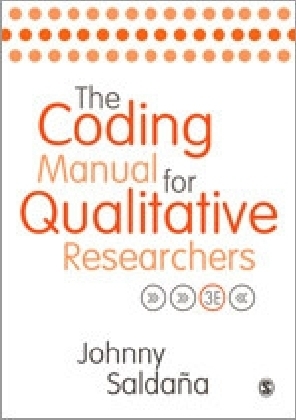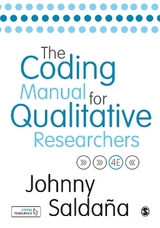
The Coding Manual for Qualitative Researchers
SAGE Publications Ltd (Verlag)
978-1-4739-0249-7 (ISBN)
- Titel erscheint in neuer Auflage
- Artikel merken
Johnny Saldaña’s unique and invaluable manual demystifies the qualitative coding process with a comprehensive assessment of different coding types, examples and exercises. The ideal reference for students, teachers, and practitioners of qualitative inquiry, it is essential reading across the social sciences and neatly guides you through the multiple approaches available for coding qualitative data. Its wide array of strategies, from the more straightforward to the more complex, is skillfully explained and carefully exemplified providing a complete toolkit of codes and skills that can be applied to any research project. For each code Saldaña provides information about the method′s origin, gives a detailed description of the method, demonstrates its practical applications, and sets out a clearly illustrated example with analytic follow-up.
Now with a companion website, the book is supported by:
SAGE journal articles showing coding being applied to real research
Sample transcripts highlighting coding techniques
Links to CAQDAS sites to introduce relevant software
Practical student exercises Links to video and digital content
This international bestseller is an extremely usable, robust manual and is a must-have resource for qualitative researchers at all levels.
Click here for a listing of Johnny Saldaña′s upcoming workshops.
Johnny Saldaña is Professor Emeritus from Arizona State University’s (ASU) School of Film, Dance, and Theatre in the Herberger Institute for Design and the Arts, where he taught from 1981 to 2014. He received his BFA in Drama and English Education in 1976, and MFA in Drama Education in 1979 from the University of Texas at Austin. Saldaña is the author of Longitudinal Qualitative Research: Analyzing Change through Time (AltaMira Press, 2003); Fundamentals of Qualitative Research (Oxford University Press, 2011); Ethnotheatre: Research from Page to Stage (Left Coast Press, 2011); Thinking Qualitatively: Methods of Mind (Sage Publications, 2015); a commissioned title for Routledge’s World Library of Educationalists Series, Writing Qualitatively: The Selected Works of Johnny Saldaña (Routledge, 2018); co-author with the late Matthew B. Miles and A. Michael Huberman for Qualitative Data Analysis: A Methods Sourcebook (4th ed., Sage Publications, 2020); co-author with Matt Omasta for Qualitative Research: Analyzing Life (Sage Publications, 2018); and the editor of Ethnodrama: An Anthology of Reality Theatre (AltaMira Press, 2005). Previous editions of The Coding Manual for Qualitative Researchers have been translated into Korean, Turkish, and Chinese-Simplified. Saldaña’s methods works have been cited and referenced in more than 16,000 research studies conducted in over 130 countries in disciplines such as K-12 and higher education, medicine and health care, technology and social media, business and economics, government and social services, the fine arts, the social sciences, human development, and communication. He has published a wide range of research articles in journals such as Research in Drama Education, The Qualitative Report, Multicultural Perspectives, Youth Theatre Journal, Journal of Curriculum and Pedagogy, Teaching Theatre, Research Studies in Music Education, Cultural Studies ? Critical Methodologies, the International Journal of Qualitative Methods, the International Review of Qualitative Research, and Qualitative Inquiry, and has contributed several chapters to research methods handbooks. His most popular journal article, “Blue-Collar Qualitative Research: A Rant” (Qualitative Inquiry, 2014), has been downloaded by over 3,000 readers, according to ResearchGate. Saldaña’s research in qualitative inquiry, data analysis, and performance ethnography has received awards from the American Alliance for Theatre & Education, the National Communication Association-Ethnography Division, the American Educational Research Association’s Qualitative Research Special Interest Group, New York University’s Program in Educational Theatre, the Children’s Theatre Foundation of America, and the ASU Herberger Institute for Design and the Arts.
Chapter One: An Introduction to Codes and Coding
Chapter Two: Writing Analytic Memos About Narrative and Visual Data
Chapter Three: First Cycle Coding Methods
Chapter Four: After First Cycle Coding
Chapter Five: Second Cycle Coding Methods
Chapter Six: After Second Cycle Coding
Appendix A: A Glossary of Coding Methods
Appendix B: A Glossary of Analytic Recommendations
Appendix C: Field Note, Interview Transcript, and Document Samples for Coding
Appendix D: Exercises and Activities for Coding and Qualitative Data Analytic Skill Development
| Verlagsort | London |
|---|---|
| Sprache | englisch |
| Maße | 170 x 242 mm |
| Gewicht | 630 g |
| ISBN-10 | 1-4739-0249-5 / 1473902495 |
| ISBN-13 | 978-1-4739-0249-7 / 9781473902497 |
| Zustand | Neuware |
| Haben Sie eine Frage zum Produkt? |
aus dem Bereich



